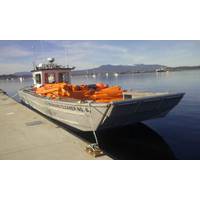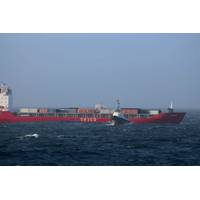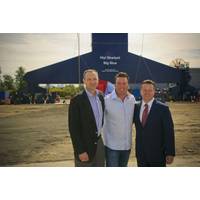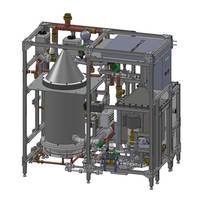Keel laying Ceremony of Damen PSVs for Atlantic Towing
In a keel laying ceremony attended by key client representatives, Damen Shipyards Galaţimarked the start of construction of two Platform Supply Vessels – PSV 5000 – for Canadian maritime services provider Atlantic Towing. The 90-metre vessels are part of a multiple vessel order thatincludes three identical supply vessels and one designed specifically for inspection, repair and maintenance duties. Atlantic Towing will mobilise all four vessels in North Atlantic oil fields off the Canadian coast. “These ships are designed to deal with the harsh environment of the Grand Banks,” explains Damen Manager North America Jan van Hogerwou.
British Columbia: Oil Spill Response shows Unprepared for More Tankers
British Columbian officials on Friday criticized the Canadian government's response to an oil spill in the waters around Vancouver, calling into question plans for new crude oil export pipelines in the Pacific Coast province. Nearly 3,000 liters of oil spilled after an anchored bulk carrier began leaking bunker fuel in English Bay, just west of Vancouver's downtown core, on Wednesday. Officials in the province said the coast guard responded but was slow to contain the slick, which spread towards beaches. They said the federal agency failed to notify the cities of Vancouver and West Vancouver until early Thursday, delaying public safety warnings by more than 12 hours.
Spill Response UNderway in English Bay

Just after 5pm April 8, Port Metro Vancouver's Operations Centre received multiple reports of an oily sheen on the water in English Bay. Harbour patrol crew then responded to investigate and confirmed a sheen on the water. This information was reported to the Canadian Coast Guard who are now working with West Coast Marine Response Corporation to manage the situation. The area has been surrounded by a specialized boom designed to keep the spill contained and allow for recovery of spilled substance. The City of Vancouver, Vancouver Policy Department and Transport Canada are also responding to the scene.
Oil Spill Response: USCG, CCG & Foss Team

Canadian, U.S. Coast Guards and Foss Maritime coordinate a textbook response operation. Robust response trumps the need for later salvage. In the early hours of Friday, October 17, the crew of the Russian cargo ship Simushir attempted to repair a broken oil heater. On its way to Pevek in the Russian Far East, the vessel suddenly lost propulsion and began drifting toward the nearest land, which in this case was the archipeligo Haida Gwaii. Just off the coast of northern British Columbia, about 30 miles south of the border with Alaska and 447 miles north of Vancouver, Simushir was carrying 50 tons of diesel and 400 tons of bunker oil, plus chemicals for mining.
Canada’s Largest Gantry Crane: Seaspan Unveils Name

After several months of anticipation and preparation, and the careful consideration of hundreds of student submissions, Seaspan officially revealed the name of its newly assembled, 300-tonne gantry crane at a boisterous unveiling ceremony at Vancouver Shipyards (VSY) today. Announcing the crane’s new name - Hiyí Skwáyel, the Squamish language translation of “Big Blue” (pronounced hee-yay sk-why-el) – was the final step in an extensive evaluation process that began with a two-week long “Crane Naming Contest” with North Vancouver School District students, from March 3 – 14.
Oily Wastewater Transformed with WETT-O

Terragon Environmental Technologies has been developing the Wastewater Electrochemical Treatment Technology for oily water, or simply WETT-O, for the past six years. WETT-O uses an electrochemical process to transform oily wastewater into reusable or dischargeable water depending on the application. WETT-O uses electrochemistry and does not require filters, membranes, chemicals or biological treatment commonly found in alternative approaches. Terragon’s proprietary Electrocoagulation (EC) cartridge employs sacrificial anodes and electricity which release ions that act as coagulants.
